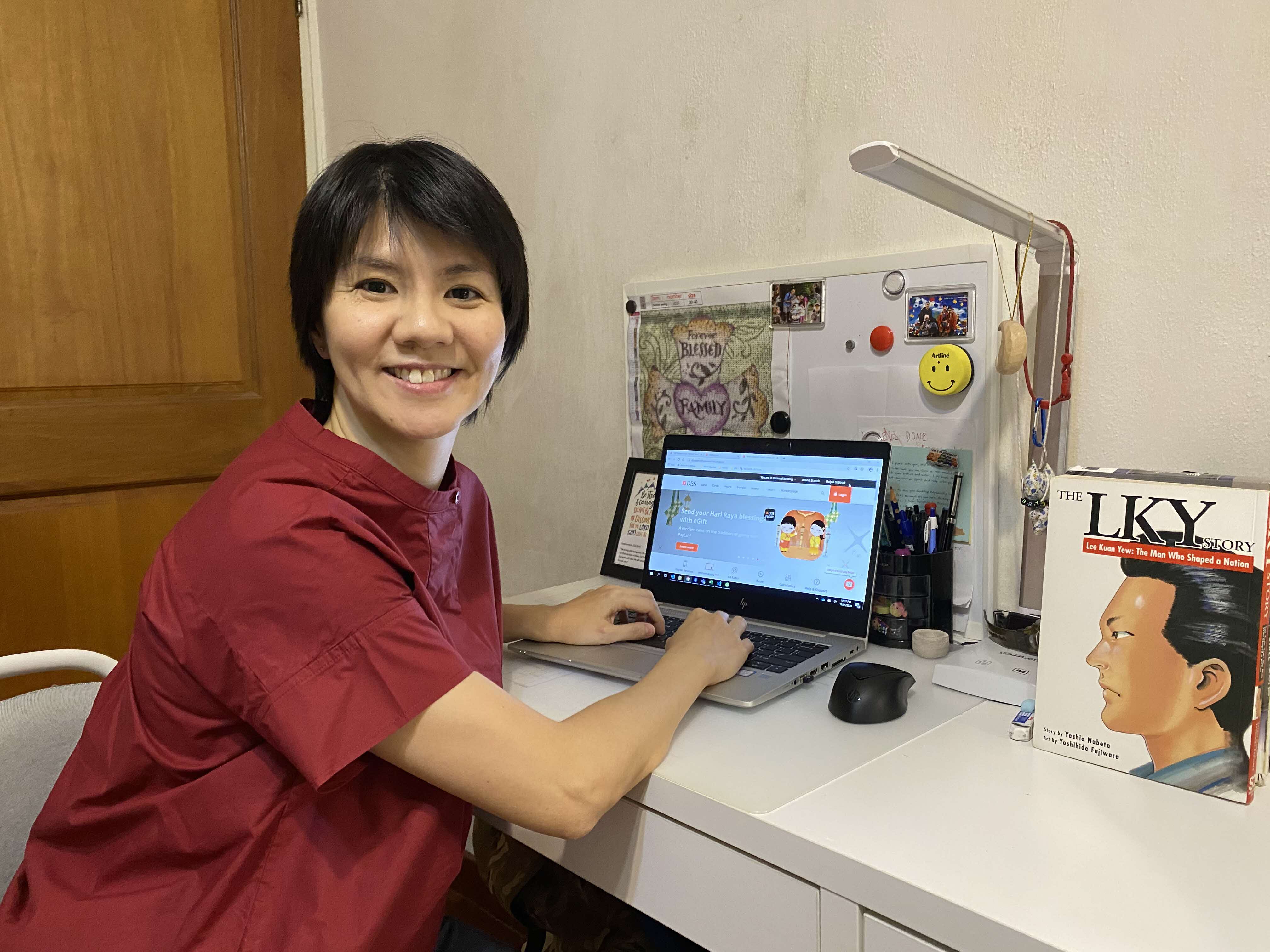As a trainee Full Stack Developer at DBS, Dawn spends her days picking up troubleshooting tasks (called JIRA tickets) and figuring out how to restructure portions of code to improve on performance and efficiency. She also looks into optimising the bank's existing webpages, employing the use of user interface and user experience (UI/UX) best practices to present information and data in more intuitive ways.
It's certainly a new experience compared to her last 14 years as a systems analyst in the telecommunications industry.
But it's never too late to pursue a new career. That's what Dawn believed when she decided to chart a new path for herself in the financial services sector.

Transferable skills are key
In her previous role as a systems analyst in a large telco company, Dawn was responsible for providing technical support and maintenance for billing systems.
In addition to regularly working with engineers, developers, and administrators to perform investigative and troubleshooting tasks on these systems, she also ensured the security and integrity of her company's customer information database when syncing between their customer relationship management (CRM) platforms and billing applications.
To an outsider, that all sounds very technical. But it basically boils down to three important skills that Dawn needed to have:
- A keen eye for detail, because accuracy is of the utmost importance when it comes to billing;
- A strong ability to analyse and interpret multiple large datasets to uncover the root causes of problems;
- Resourcefulness and critical thinking skills to resolve complex issues and ensure minimal system downtime.
And these were the exact skills that gave her a head start in her career transition to a Full Stack Developer in the financial services industry.

While Dawn acknowledges that there are unique challenges to the financial services industry—like the need to be cognisant of MAS regulations and have a more thorough understanding of business terminologies —she also recognises that there is little difference between telco and finance when it comes to their customer-centric nature and high demand for precision.
"Business processes and statutory regulations between telco and finance may be different, but the software development methodology is the same," she says.
And while Dawn had no prior training in coding or web development, her personal interests and initiative to learn made it easier for her to make the transition.
"I graduated with a degree in Electrical and Electronic Engineering from NTU, so I had no formal training in programming," she shares. "Most of my programming knowledge was self-taught or learnt through my previous role as a systems analyst."
Seizing opportunities from digitalisation
Dawn knew clearly from the start that she wanted to upskill to increase employability and expand her opportunities.
"With Industry 4.0 and a push for digital transformation in the banking sector, I expected a greater demand for talent related to digital banking"
"And coupled with my deep interest in technology and a strong desire to I saw the Technology in Finance Immersion Programme (TFIP) as the perfect opportunity for me to acquire emerging technology skills while receiving on-the-job experience in the financial services sector," she says.
A combined effort between the Institute of Banking and Finance (IBF), Workforce Singapore (WSG), Infocomm Media Development Authority (IMDA), and Monetary Authority of Singapore (MAS), the TFIP was developed to help professionals build expertise and gain experience in highly sought-after and emerging technology areas in the financial services sector. These technology areas include Artificial Intelligence, Cloud Computing, Cybersecurity, Data Analytics, and Full Stack Development.
"I signed up for the Full Stack Development track as it is a growth area. More importantly, they fit my interests and strengths," Dawn shares. "I saw a potential increase in demand for talent in this area, which means more opportunities to grow my career."
And after completing her two-month intensive training course with the NUS Institute of Systems Science (NUS-ISS), Dawn is now serving the remainder of the 24-month traineeship with DBS. "I'm currently attached to a project that involves UI design and development, and I'm able to apply many of the skills and frameworks learnt in my NUS-ISS course," she says.
Maximising learning experience with an integrative approach
When asked about the challenges she's faced adapting to a completely new industry, Dawn admits that the toughest part was probably going through the rigorous NUS-ISS course.
"The course focused on programming languages most commonly used by financial institutions, and the lessons were condensed and concise with many important concepts covered. It was important to revise daily and have a good understanding of every class, because each session built on the previous one," she recalls.
"You need to have a positive outlook and enduring stamina for this course. And because IT is an ever-evolving industry."
"It's important to be a keen learner to readily adapt to any changes; self-learning is an important attitude to possess, even if that means many late nights and burnt weekends"
And through overcoming these challenges, Dawn found great joy and motivation. "I built a working e-commerce website using all the new skillsets I learnt during the course," she shares proudly. "I also made new friends and got to meet many like-minded people to study and share experiences with."
But the classroom is only one part of TFIP. The other, perhaps more important, part is the traineeship with a partner financial institution. This is where Dawn gets to put what she's learnt in theory into real-world application.
She uses frameworks like Agile Development Methodology and DevOps Deployment Methodology daily, and applies the programming languages and UI/UX design principles she learnt to improve the bank's digital platforms and applications. As part of her day-to-day, she is assigned JIRA tickets, and works with a supportive team that she can actively discuss and exchange ideas with. She also looks at ways to improve existing codes to minimise error and increase efficiency.

To assist her learning, Dawn has a mentor at DBS with whom she can consult throughout her traineeship, and IBF checks in regularly to ensure that she is given the best exposure possible to help her become a full-fledged developer.
“TFIP gave me a good head start and confidence in my mid-career switch,” she shares. “The on-the-job training component is important as it allows me to venture into the world of a full stack developer within an encouraging, safe and stimulating environment.”
And Dawn hopes to pay it forward by being a mentor herself one day for future batches of TFIP trainees.
“I hope that I can continue to work in companies such as DBS where TFIP trainees will be attached, as I feel that I will be able to relate to them well and guide them along in their journey,” she shares.
If there was one thing she would encourage for future TFIP trainees? “I would say do as much self-study as you can before the start of the structured learning course, to make the structured learning a more meaningful experience.”

Visit the TFIP website to learn more about the technology areas available for training, and the participating financial institutions that are supporting this programme.
(Information in this article are accurate as at time of publication, July 2020)
.png?sfvrsn=7a1194d1_1)
 Overview
Overview














.png?sfvrsn=86556ebb_1)
.png?sfvrsn=a8212bcc_1)
.png?sfvrsn=858c63d1_1)
2b4307cf-e91f-4368-ac62-cf234d6d2b1c.png?sfvrsn=212575fd_1)